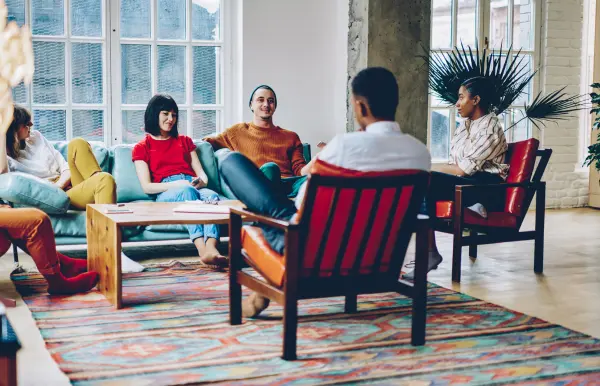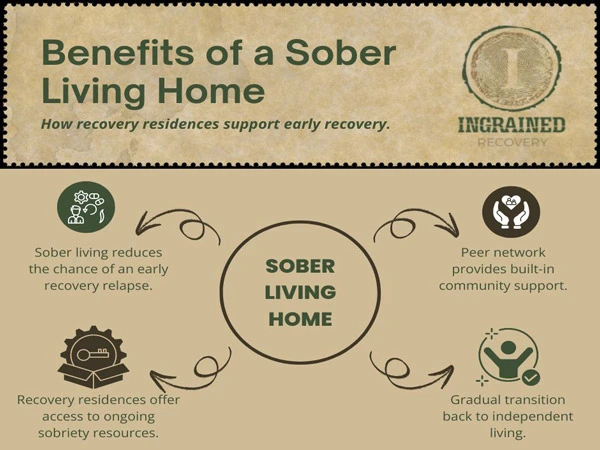A Guide to Finding Recovery Residences in Atlanta from Ingrained
For many struggling with addiction, the return to sobriety is somewhat like a bird finding its way back to the flock after a gust of wind has blown it off course. The fight to rejoin the flock was long and hard, but the bird used previously untapped inner strength and honed its sense of direction to rejoin its brethren.
If you’re Googling “sober living Atlanta,” that bird analogy might describe your recovery journey.
Ingrained Recovery, a luxury rehab ranch in Eastman, is a proven destination for recovery support and success. It offers integrated options for a full continuum of support. The fifty-acre property allows secluded care for those seeking a stable and private treatment option, a two-hour drive from the Atlanta metropolitan area. We also work with Atlanta outpatient and recovery residence partners to ensure you experience a smooth transition when you go home.
We invite you to read more to learn how sober living homes offer tremendous support after completing your rehab program.
Get Effective Treatment Programs at Ingrained Recovery

A Sober Living Program Helps You Continue Your Recovery Journey
We help clients graduating the Ingrained Recovery residential programs connect with recovery residences that are part of the Georgia Accredited Recovery Residences (GARR) network.
These facilities meet or exceed state standards, proving they will provide a safe, supportive environment for people transitioning from inpatient care to long-term sobriety.
Here are some key reasons why we only recommend GARR sober living facilities to our clients:
GARR Accreditation Ensures a Safe Sober Living Community
GARR-accredited sober living homes must comply with rigorous state standards. GARR certifies each member sober living facility based on safety, structure, and accountability of the residents. They also inspect each sober living home regularly for compliance and to maintain accreditation.
These standards help you find a safe haven when you return home to Atlanta, Georgia. You will feel comfortable and safe as you continue working on long-term recovery without any worries about the recovery environment.
Commitment to Ongoing Recovery and Life Skills Development
GARR recovery residences usually provide a standard structure to support each resident as they reintegrate into daily life while they continue working on recovery programs and build or hone valuable life skills. House rules most often include:
- Mandatory house meetings
- Random drug screenings (with a zero-tolerance policy)
- Curfews
- Participation in 12-Step programs or SMART Recovery meetings.
This structured environment helps people continue making progress toward a sober life.

Balancing Peer Support and Independent Living
We mentioned our equine therapy earlier. Besides horses, we often suggest other alternatives, based on each client’s unique needs. You may benefit from art or music therapy, yoga, or mindfulness training.
Who knows? Maybe you’ll be the next successful neurointegration therapy program participant.
GARR recognizes that sober living options vary according to resident needs. One sober home may be peer-run and have less structure while another community has clinical staff on board to meet the continuing needs of early recovery.
GARR ranks these on levels one through four, with 1 being the least formal program and 4 the most highly structured.
The GARR rating system helps individuals committed to recovery decide on the best living arrangement for supporting their new sober lifestyle.
Get Proven Detox and Rehab Options at Ingrained

The Advantages of a Sober Living Facility for Lasting Recovery
Does all that sound good, but you’re still not convinced a sober living program is the best thing for you? Here are the reasons why many choose recovery residences instead of moving directly to their apartments or homes right after rehab:
Reducing the Chances of Relapse
Sober living in Georgia, particularly in Atlanta, can be perilous for sustaining the recovery process. The city’s environment is exciting and fast paced, but that vibe also means many temptations.
Most sober living homes have regular testing and a strict no-use policy. Residents continue to sharpen their newly developed coping skills and build resilience in a recovery house.
Continued Access to Recovery Resources
There’s a common misconception that people leave their recovery clinic and instantly ready to face society again. Early recovery is still a very fragile time. The truth is that almost every person in that stage needs additional services.
For some, that might be Alcoholics Anonymous (AA) meetings. But for others, it means they need a step-down program like an intensive outpatient program or partial hospitalization program. Many sober living homes are chosen for the close proximity to these vital services and resources.
Transition to Independent Living When Ready
A sober living program is a bridge between residential treatment facilities and living independently right away. The environment of a sober network allows all residents to solidify the new habits that will help maintain sobriety.
Here are some things residents to start resuming daily living activities from the safety of the sober living home:
- Seeking employment or enrolling in job training
- Attending counseling or recovery group meetings
- Reclaiming responsibility for money
- Reconnecting with sober family and friends
- Working on other personal growth goals
Each person who has overcome addiction has unique needs. Many cannot make continued progress without a helping hand – sober living homes give them the support they need.
A Strong Sense of Community Support

Residents in a sober living facility become each others’ greatest cheerleaders as they continue making strides in the recovery journey. Community members offer mutual encouragement, support, and accountability. Nobody better understands struggling with addiction and wading through its aftermath better than the other house residents, who have similar lived experiences.
Find Educational or Career-Enhancing Opportunities
Atlanta residents have multiple resources to develop better job skills and reintegrate into the workforce. Goodwill of Atlanta offers a “Career Connector” service, an online portal that’s free to community residents and easy to use.
According to their website, they had tremendous results in 2023, putting 22,113 high-risk residents to work earning working to middle-class wages and helping over 43,000 jobseekers build a new life.
Even clients who have a job may use this time to reconsider whether its time to pursue a career that better meets their new life goal of sobriety. Career Connector is open to all who are ready to accept new responsibility and the challenge of a new job.
Recommit to Getting Fit
Much research confirms that physical activity supports better mental health. An article from Mass General suggests that physical exercise is highly effective for maintaining your mental wellness.
Sober living house residents often have access to on-property fitness equipment. If not, there are often nearby parks, running tracks, or fitness trails. Your recovery has given you back your physical and mental well-being. Why not commit right now to getting fitter so you can enjoy your new life even longer?
Up To 100% of Rehab Costs Covered By Insurance
Contact Ingrained Recovery to Start on a Path to Sober Living
Do you or a loved one need professional programs to stop using drugs or alcohol? If you recognize that you need help to get clean and sober, our team can help. We can offer you medical detox and residential support at our Eastman, Georgia, location.
And, following treatment, we can connect you with outpatient services and sober living in Atlanta. We are committed to providing effective treatment programs and recovery services to help you or your loved one achieve lasting recovery.
Do you have questions about treatment services and the path to living sober? We are happy to discuss our programs and recovery opportunities. Call us confidentially today.
